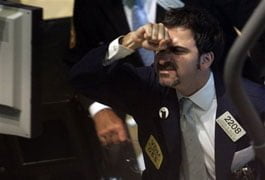The Financial Times has reported a debate among accountants
about giving a ‘fair value’ to company assets. (Reporting move could break
the writedown spiral, April 3rd)
What does this mean?
As we know, finance capital has a slight problem at present.
Banks, hedge funds and other financial institutions have assets on their books
that they have found out are actually not worth as much as they thought when
they paid for them.
They may, for instance, have run out and bought pieces of
coloured paper that looked like a perfectly decent performing asset. (This
means that it pays a return, not that it balances a ball on its nose.) They
have since found out that a crook sold sub-prime mortgages to people in Ohio who
could not possibly repay the debt. These people have since had their houses
repossessed. They are homeless.
‘Tough,’ thinks the financier, ‘But what’s that got to do
with me?’ Well, the right to acquire unearned income from that sub-prime
mortgage is part of a piece of paper in the bank’s vaults called a
collateralised debt obligation. Don’t worry if you don’t know what that means.
The banker didn’t know when he bought it either.
The point is, the homeless family is not going to be paying
off the mortgage any more. But the income stream from the mortgage payer was
what made the CDO worth buying. If the asset is now non-performing, it’s not
really an asset. It’s toilet paper.
The normal accountancy practice is for assets to be valued
at what they’re really worth now, not what the financial institution originally
paid for them. The asset base should be written down – admit the assets are
toilet paper. But who would want to invest in a bank when its vaults are full
of toilet paper?
Well, the accountants can help! As the Financial Times
(April 3rd 2008) points out, “However in these market conditions”
(the credit crunch) “this index does not reflect the fair or true value – the
practice of marking assets to market prices that has led to billions in
writedowns – since realistically the risk of default is much lower than the
index level implies.
“Announcements of writedowns cause this index to fall
further, which in turn means that other players need to make writedowns. Their
share prices continue to fall, and they continue to find it difficult to access
the regulated financial markets. There is actually no end in sight to this
downward spiral.”
Fortunately our accountants are problem solvers on a par
with the Wizard of Oz. The only difference is that, while he provided entrants
to his realm with green glasses, the accountants give us all rose-tinted
spectacles to overcome the problems of capitalism. Accountants should not
record what assets are actually worth but what they ought to be worth in a
perfect world, suggest the European Commission’s expert advisers.
It’s been done before. In the 1970s, western banks
practically hurled money at countries such as Argentina and Brazil. In 1982,
these countries defaulted. They couldn’t pay. There was a debt crisis and
therefore a banking crisis. Again the US and European regulatory authorities
allowed the banks to carry the Latin American loans at face value. But they
weren’t worth anything! The accountants were given the nod to cook the books.
Helpful people, accountants.
Accountants are also private people. They have a lot to be
private about. When Enron went bust amid great scandal and fraud in 2001,
accountancy firm Arthur Andersen tried to help the firm’s top management in its
difficulty. They were busy shredding incriminating documents right up to the
moment when the police came for the Enron bosses with handcuffs. Remember,
accountants are always there to help.
Understandably, the suggestion about ‘fair value’ has met
with incredulity and outrage from some quarters. Charles Tilley, Chief
Executive of the Chartered Institute of Management Accountants and evidently
one of the old school, wrote to the FT as follows. “Imagine the co-driver in a
rally car calling the next corner in a particularly tricky section of a winding
forest course based on what he has observed over the past few miles – the car
would soon end up on its roof in the woods. What the driver needs to know is
what he has to deal with now, no matter how bad it looks. Only then can he hope
to make the correct decisions on how best to steer through his immediate
problems.”
So
maybe the accounting system isn’t the problem. Maybe the problem is the
capitalist system.






